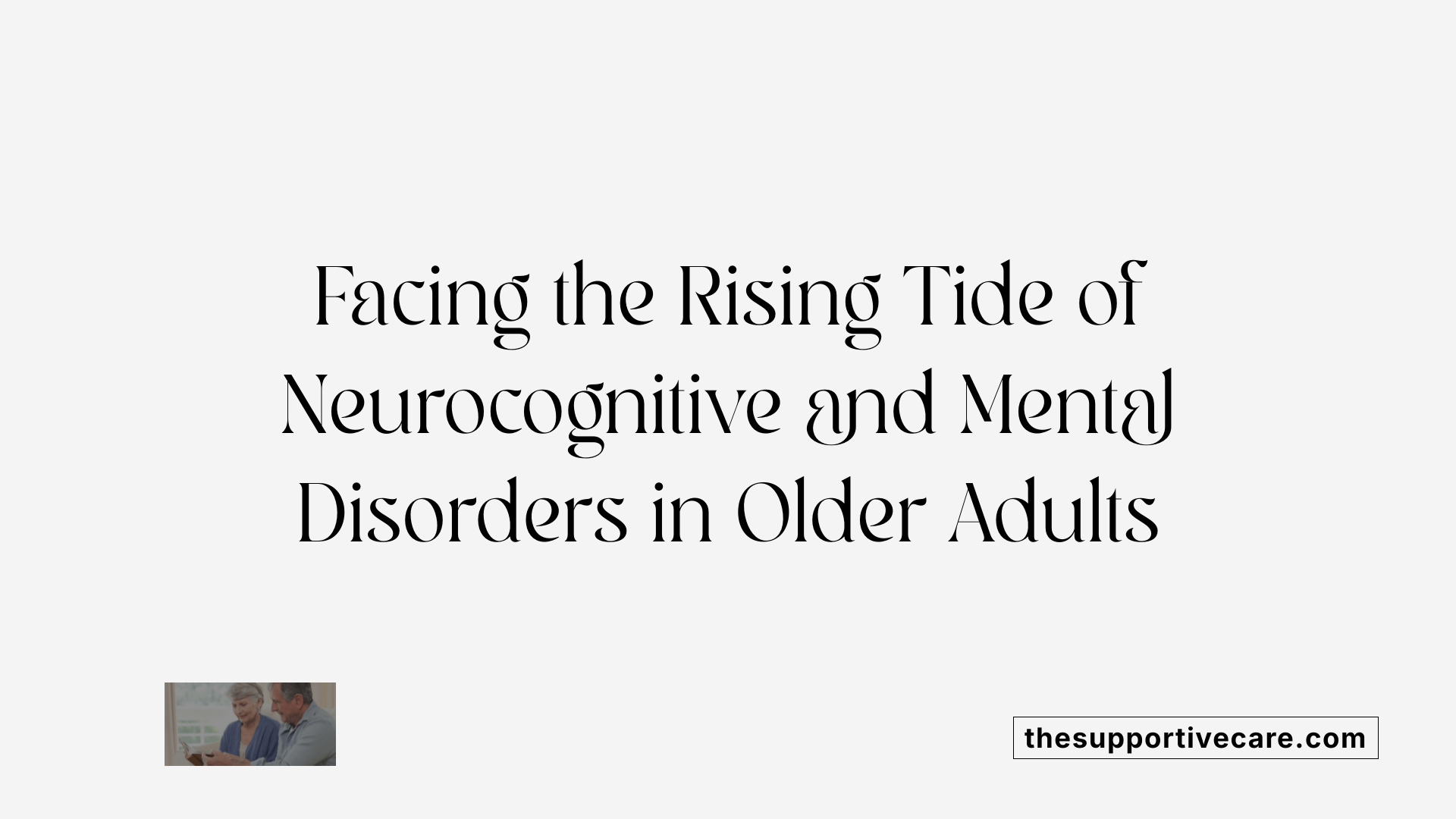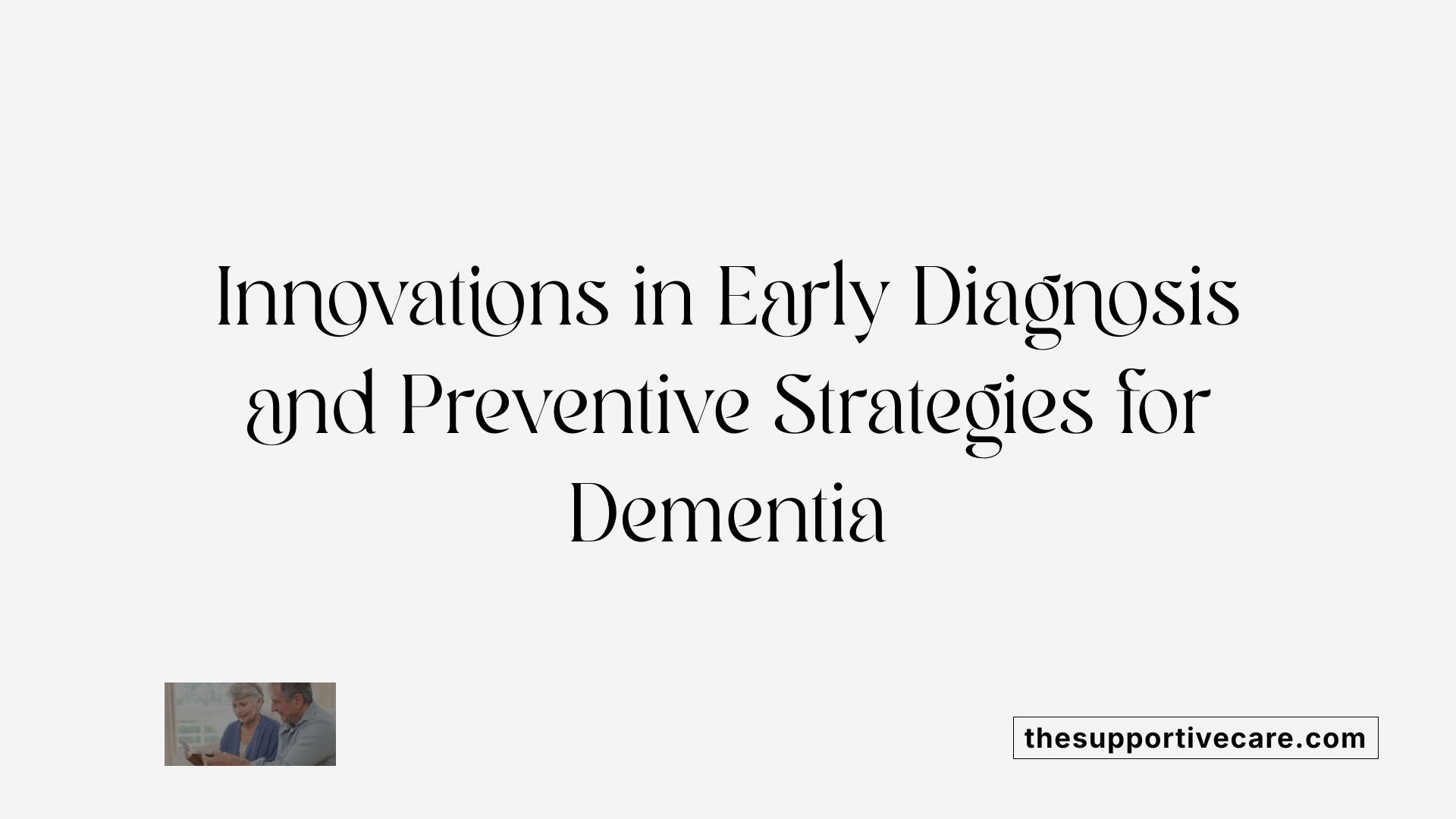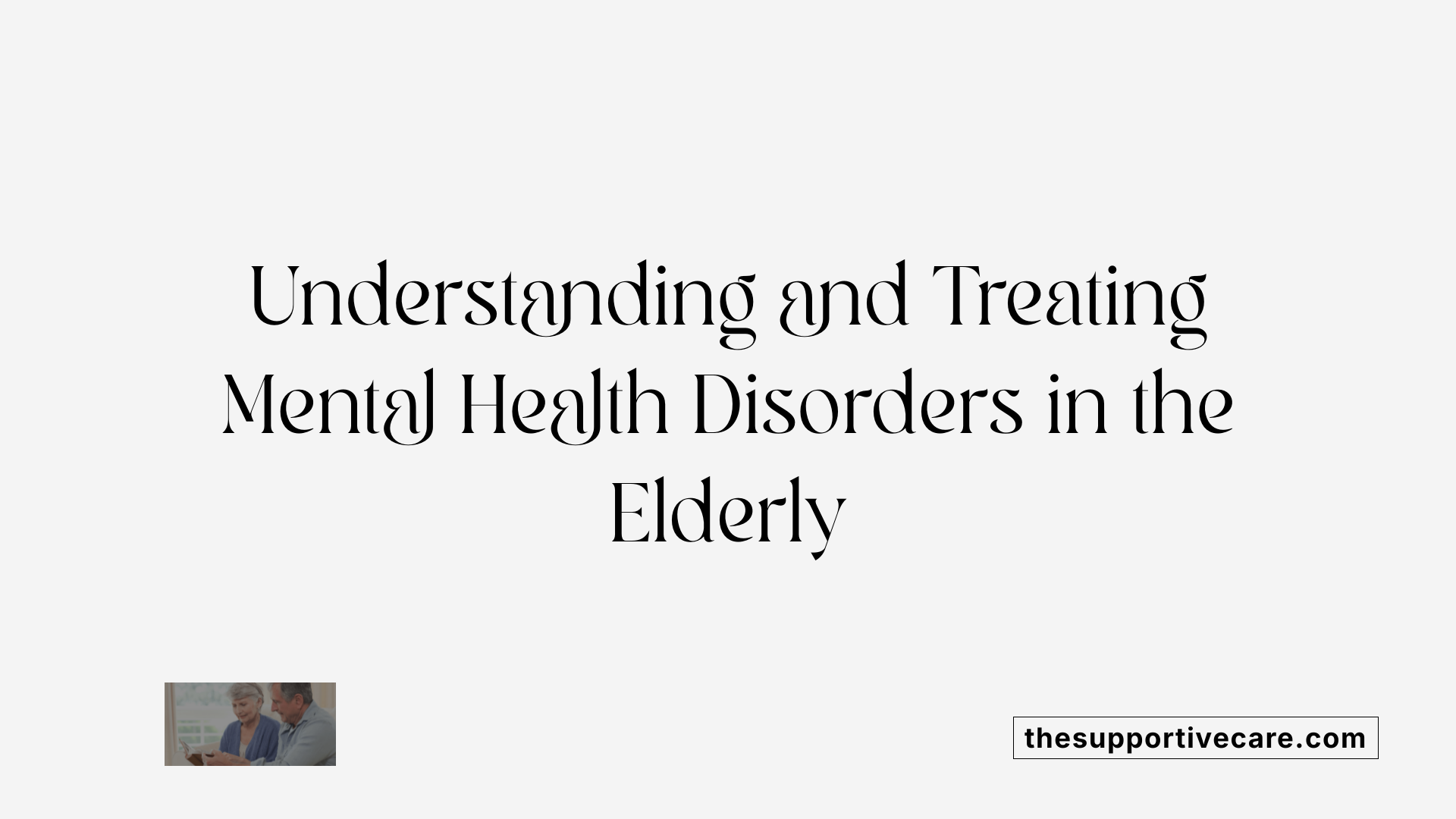Understanding the Growing Need for Integrated Elderly Care
As the global population ages rapidly, with projections indicating that by 2050 one in six individuals will be aged 65 or older, healthcare systems worldwide face mounting challenges in addressing the unique neurological and psychological needs of elderly patients. Mental health disorders, cognitive decline, and substance use disorders increasingly intersect in this demographic, demanding comprehensive, integrated approaches to care that span medical, psychological, and social domains to improve outcomes and quality of life among older adults.
The Rising Prevalence of Neurocognitive and Mental Disorders in Older Adults

What are the key neurological and psychological challenges faced by elderly populations?
The global population is aging rapidly, with projections estimating that by 2050, one in six individuals will be aged 65 or older. This demographic shift brings an increasing prevalence of neurocognitive and mental health disorders among older adults.
Neurocognitive disorders, especially dementia and Alzheimer's disease, represent a significant concern. In 2019, an estimated 57.4 million people worldwide were living with dementia, a figure expected to rise to 152.8 million by 2050. Alzheimer's disease, the most common form of dementia, contributes prominently to this rising global burden.
Mental disorders also play a major role in disability among older adults. Conditions such as late-life depression affect approximately 6.7% to 7.5% of the elderly population annually. These mental health challenges often coexist with chronic physical illnesses, creating complex healthcare needs.
In addition to medical factors, social challenges intensify these issues. Older adults frequently experience stigma, ageism, and social isolation, which can exacerbate mental health conditions and impede access to care.
Understanding the intertwined nature of neurological, psychological, and social factors is essential for addressing the increasing mental health demands of the aging population.
Advancements in Diagnosis and Prevention of Dementia and Cognitive Decline

How have recent scientific advances improved early diagnosis and prevention of dementia?
Recent scientific breakthroughs have significantly enhanced the early detection and prevention of dementia, particularly Alzheimer's disease. The development of novel biomarkers plays a central role in this progress. Techniques such as amyloid and tau protein imaging along with cerebrospinal fluid (CSF) assessments enable clinicians to identify pathological changes in the brain before severe symptoms manifest.
Emerging blood-based biomarkers offer a less invasive, more accessible diagnostic option, promising earlier and more widespread screening capabilities. These tools collectively allow for a more accurate and timely diagnosis, which is crucial for intervention and care planning.
Prevention strategies emphasize managing vascular risk factors like hypertension and diabetes, which are associated with cognitive decline. Additionally, promoting physical exercise, mental stimulation, and adherence to a balanced diet supports brain health.
Studies like the Finnish Geriatric Intervention Study to Prevent Cognitive Impairment and Disability (FINGER) demonstrate that multi-domain interventions—combining diet, exercise, cognitive training, and vascular risk monitoring—can significantly improve cognitive performance and delay disability progression in at-risk older adults. This integrated approach marks a promising advance in combating dementia's global burden.
Complexities of Mental Health Disorders Among the Elderly

What mental health disorders are prevalent in elderly populations and what treatments are effective?
Late-life depression is highly prevalent among older adults, affecting about 6.7% to 7.5% annually. It stands as a major contributor to disability globally in this age group. Effective treatment often involves a combination of pharmacotherapy and psychotherapy. Collaborative care models, which integrate mental health services with primary care, have shown promising results in improving treatment adherence and outcomes for elderly patients.
Schizophrenia in older adults presents heterogeneously. Many experience stabilization or improvement of symptoms over time, but comorbid physical health issues are common, posing additional management challenges. Treatment advances include pharmacological options tailored for elderly patients, as well as psychosocial interventions, such as community-based programs aimed at improving daily functioning and social skills.
Innovations in care delivery include telepsychiatry and digital health tools, which facilitate access to specialized care for seniors who may face mobility or transportation barriers. These interventions complement traditional in-person services, enhancing continuity and flexibility of care.
Evidence-based psychiatric treatments for elderly individuals with serious mental illness encompass a range of psychosocial interventions. Assertive Community Treatment (ACT), Cognitive Behavioral Social Skills Training (CBSST), and Integrated Illness Management and Recovery (I-IMR) programs have been specifically adapted for older adults, demonstrating improvements in medication adherence, social functioning, and management of both psychiatric and chronic medical conditions.
Table: Overview of Common Mental Health Disorders and Treatments in Older Adults
| Disorder | Prevalence/Impact | Treatment Approaches |
|---|---|---|
| Late-life Depression | 6.7%–7.5% annual prevalence; major disability cause | Pharmacotherapy + psychotherapy, collaborative care |
| Schizophrenia | Heterogeneous symptoms; common comorbidities | Pharmacological treatment, psychosocial & community programs, telepsychiatry |
Comprehensive, multidisciplinary care models that integrate mental health with medical and social support are essential to effectively manage the complex needs of elderly patients with mental health disorders. These approaches not only address symptoms but also improve overall quality of life and social engagement.
Substance Use Disorders in the Aging Population: An Underrecognized Epidemic

How prevalent are substance use disorders among the elderly and what factors complicate their diagnosis?
Substance use disorders (SUDs) affect about 1 in 11 adults aged 60 and older as of 2022, marking a significant and growing concern in geriatric health. This rise in prevalence reflects increased use of alcohol, cannabis, and prescription medications, particularly opioids and benzodiazepines, among older adults. The aging baby boomer cohort contributes notably to this trend, as their prior higher rates of substance use persist into later life.
Physiological changes that accompany aging—such as decreased liver function and muscle mass—alter how substances are metabolized and absorbed, intensifying the effects even at lower doses. For example, older adults experience more pronounced central nervous system impacts from alcohol, increasing risks of falls, cognitive decline, and medication interactions.
Diagnosing SUDs in older adults presents unique challenges. Symptoms often mimic normal aging or chronic diseases, leading to frequent underdiagnosis. Conditions like forgetfulness, mood changes, or impaired mobility may be mistakenly attributed solely to aging rather than substance misuse. Further complicating detection are social factors like stigma, isolation, and limited access to specialized screening. Notably, routine screening for substance misuse is rarely practiced in this age group.
Impact of COVID-19 on substance use among older adults
The COVID-19 pandemic exacerbated these issues by increasing social isolation and stress, which serve as triggers for substance misuse. Meanwhile, the expansion of telehealth created both opportunities and hurdles for identifying and managing SUDs remotely. Adapting healthcare systems to address the specific needs of older adults during crises like the pandemic remains a priority.
In addressing these challenges, validated screening tools such as AUDIT-C and CAGE, tailored educational efforts to reduce stigma, and comprehensive, age-appropriate interventions are crucial. Recognizing substance use disorders as complex but treatable in older adults can improve diagnosis, encourage treatment engagement, and ultimately enhance quality of life for this vulnerable population.
Tailored Treatment Approaches for Substance Abuse and Co-Occurring Conditions in Older Adults

What are comprehensive treatment services for substance abuse, mental health issues, and various forms of addiction?
Comprehensive treatment services for older adults struggling with substance abuse and co-occurring mental health issues employ a multidisciplinary, integrated approach. These services combine physical, psychological, and social aspects of care, recognizing the complexity of aging-related challenges.
Key components include thorough assessments to identify substance use patterns, psychiatric comorbidities, medical conditions, and social factors. Detoxification protocols are carefully managed considering older adults’ altered metabolism and sensitivity. Treatment plans often incorporate individual and group psychotherapy sessions tailored to the elderly, emphasizing cognitive-behavioral therapy (CBT), motivational interviewing, and supportive counseling.
Pharmacological therapies are evidence-based and adapted for aging physiology. For example, medications like naltrexone are utilized to reduce alcohol cravings, with careful monitoring to avoid drug interactions. Psychotherapeutic interventions might include twelve-step facilitation or motivational enhancement therapy tailored to older populations.
Family and community involvement play a crucial role, providing emotional support and helping to reinforce positive health behaviors. Community-based programs and telehealth services enhance accessibility and continuity of care. The overall goal is to create personalized, holistic treatment pathways that improve cognitive function, mental health, social integration, and quality of life.
Older adults benefit from integrated programs that address both substance use disorders and co-occurring mental illnesses, such as depression or neurocognitive disorders, through collaborative care models. These approaches reduce hospitalization rates and support long-term recovery.
| Treatment Aspect | Description | Special Considerations for Older Adults |
|---|---|---|
| Multidisciplinary Assessment | Evaluates substance use, mental health, physical health, social context | Must account for age-related physiological changes and comorbidities |
| Behavioral Therapies | CBT, motivational interviewing, twelve-step facilitation | Adapted for cognitive status, sensory deficits, and learning pace |
| Pharmacological Interventions | Use of medications like naltrexone and buprenorphine | Monitoring for polypharmacy, altered metabolism, and side effects |
| Family and Community Engagement | Incorporates social support, education, and community resources | Addresses social isolation and stigma, encourages sustained support |
| Delivery Modes | In-person, telehealth, community-based programs | Accessibility tailored for mobility and technological comfort |
Integrated Neurological and Psychological Care: Addressing Comorbidity and Complex Needs
Why is integrated neurological and psychological care critical for elderly patients?
Mental illnesses, cognitive decline, and substance use disorders often co-occur in older adults, creating complex clinical pictures that require holistic attention. Approximately 98% of people living with dementia experience neuro-psychiatric symptoms, including anxiety, depression, psychosis, and substance misuse. These overlapping conditions not only exacerbate each other but also significantly reduce quality of life and complicate management.
How do neuro-psychiatric symptoms manifest in dementia?
Dementia patients frequently develop behavioral disorders that affect mood and cognition. Symptoms such as anxiety, depression, and psychosis regularly appear along with cognitive impairment. These manifestations can lead to increased social isolation, worsening cognitive function, and interfere with effective treatment if approached in isolation.
What is the role of multidisciplinary and person-centered care?
To address the diverse and interconnected needs of elderly patients with mental, cognitive, and substance use disorders, coordinated multidisciplinary care is essential. This approach integrates neurological, psychiatric, and social support services with personalized treatment plans tailored to individuals’ psychological, cognitive, and physical health. Emphasis on person-centered care promotes continuous treatment across different care settings — including inpatient, outpatient, community, and rehabilitation services — improving adherence, outcomes, and quality of life.
What barriers exist to care integration and what solutions are proposed?
Fragmented healthcare systems often separate neurological and mental health services, leading to disjointed care. Stigma, ageism, and under-recognition of overlapping disorders in elderly populations also impede integrated treatment efforts. Proposed solutions include policy reforms enabling system-wide coordination, increased provider training on comorbidities, adoption of evidence-based integrated care models, and use of new technologies for screening and management. Enhanced advocacy and funding can support sustainable integration.
Integrated care models acknowledge that treating neurological and psychological health simultaneously is vital to address the full spectrum of elderly patients’ needs and to improve their overall health outcomes.
Addressing Social and Health Inequities in Elderly Mental Health and Addiction Care
What social factors influence mental health and substance use disorder outcomes in older adults?
Stigma, ageism, and social isolation are significant social factors that negatively impact the mental health and substance use disorder (SUD) outcomes in older adults. These factors contribute to challenges in seeking help, adherence to treatment, and social support, which are critical for recovery. Older adults often face marginalization in healthcare settings due to age-related biases, which can delay diagnosis and limit access to appropriate care.
Racial and socioeconomic disparities further complicate this picture. Minority groups and individuals from lower socioeconomic backgrounds experience higher rates of mental illness and substance misuse but face greater barriers to care. These include limited availability of culturally sensitive services, financial constraints, and discrimination, all of which lead to inequitable health outcomes.
Strategies to improve equity and inclusion in care delivery
Improving equity in mental health and addiction care for the elderly requires comprehensive, culturally competent approaches. Implementing tailored screening tools sensitive to older adults' unique needs can enhance early detection. Training healthcare providers to recognize and address implicit biases and ageism is essential.
Community-based support initiatives that foster social inclusion help reduce isolation and stigma. Policymakers must prioritize expanding access to affordable, equitable care, incorporating multidisciplinary teams that understand social determinants of health.
Integration of personalized care models that consider cultural, social, and economic backgrounds will improve treatment engagement and outcomes. Moreover, promoting health literacy and facilitating family involvement can empower older adults navigating mental health and substance use challenges.
Together, these strategies can help mitigate disparities and foster a more inclusive framework for addressing the complex mental health needs of aging populations.
Future Directions: Research, Innovation, and Policy for Enhanced Elderly Care
What future advancements and policy efforts are needed to improve neurological and psychological care for elderly patients?
Ongoing research is crucial for advancing our understanding of neurological and psychological health in older adults. Priorities include the continued study of biomarkers to enable earlier and more accurate diagnosis of conditions like Alzheimer's disease and other dementias. Equally important is research into medication safety and preventive strategies tailored to the unique needs of the aging population, helping to manage response variability and reduce adverse effects.
Innovation in digital health and telepsychiatry is transforming access to care. These technologies help overcome barriers faced by older adults, such as mobility limitations and geographic isolation, facilitating continuous, person-centered treatment. Expanding telehealth programs and incorporating digital tools into routine care supports more comprehensive management of mental health and substance use disorders among the elderly.
On the policy front, frameworks like the World Health Organization’s mhGAP Initiative promote the integration of mental health, neurological, and substance use services into general health care systems. These efforts encourage coordination across disciplines and service levels, ensuring that elderly patients receive holistic and equitable care.
To sustain these improvements, robust training programs and resource allocation for healthcare providers are essential. Educating professionals on geriatric-specific issues and evidence-based interventions enhances care quality. Equipping health systems with adequate resources ensures scalability and responsiveness to the growing needs of older adults worldwide.
Together, these research directions, innovations, and policy measures form a foundation for improved neurological and psychological care, advancing health outcomes and quality of life for the aging global population.
Toward Holistic and Compassionate Elderly Care
The intersection of neurological and psychological care in elderly patients presents complex challenges shaped by increasing longevity, rising neurocognitive and mental health disorders, and evolving substance use patterns. Achieving improved outcomes demands comprehensive, integrated treatment models that address the multifaceted needs of this vulnerable population. Enhanced early diagnosis, tailored therapies, social support, and equity-driven policies are crucial. Continued innovation and global commitment will be key to transforming care delivery, ensuring dignity, quality of life, and recovery opportunities for older adults worldwide.
References
- Mental health care for older adults: recent advances and ...
- Treating substance misuse in older adults
- Substance Use Disorders in the Geriatric Population
- Psychosocial Interventions for Older Adults With Serious ...
- Substance Use Disorders & Mental Health in Older Adults
- Substance Abuse in Older Adults: Treatment for the Elderly
- Dementia, Mental Illness, and Substance Use Disorders ...
- Substance Abuse in the Elderly
- Mental Health, Brain Health and Substance Use


































































































